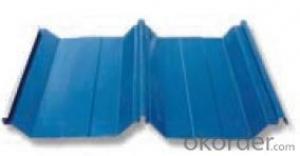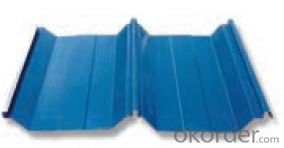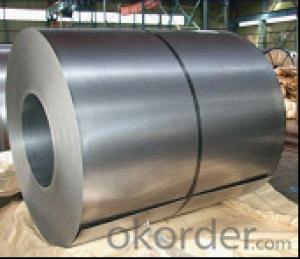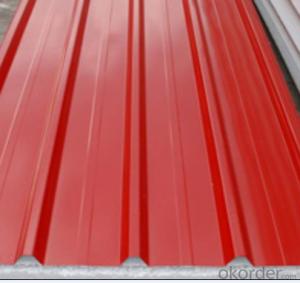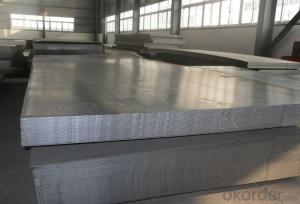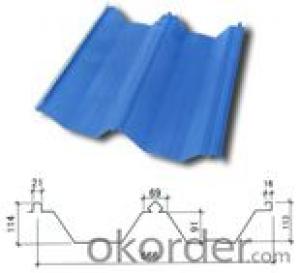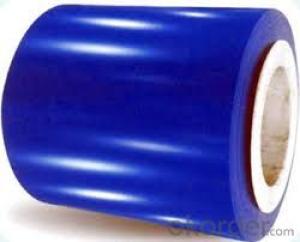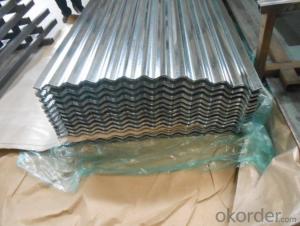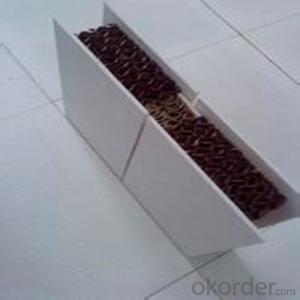corrugated color steel sheet DX51D
- Loading Port:
- China Main Port
- Payment Terms:
- TT OR LC
- Min Order Qty:
- -
- Supply Capability:
- -
OKorder Service Pledge
OKorder Financial Service
You Might Also Like
Quick Details
| Standard: | Grade: | Thickness: | |||
| Place of Origin: | Brand Name: | Model Number: | |||
| Type: | Technique: | Surface Treatment: | |||
| Application: | Width: | Length: |
Packaging & Delivery
| Packaging Detail: | Fully seaworthy export packing with paper tube Each coil is wrapped in water-proof paper.Pallet as your choosing . wooden pallet and steel pallet as your choosing |
| Delivery Detail: | about 15 days after the deposit if the quantity below 500 tons |
Specifications
1.Thickness: 0.15mm-1.0mm
2.Width:914mm-1250mm
3. z40-z275g/m2
4. Delivery time: about 15 working days
5.ISO 2000,
Suzhou Jincheng Metal Product Co., Ltd. |
PRODUCT:STEEL SHEET(GI,GL,CR,PREPAINTED,CORRUGATED)
MAIN SPECIFICATIONS:
1,Base Metal: COLD ROLLED(CR)
2,Zinc Coating: z40-z275,Az40-Az150
3,Thickness:0.15mm-4.0mm(GI),0.23mm-2.0mm(GL),0.15mm-3.0mm(CR),0.15mm-1.5mm(PREPAINTED),0.15mm-1.0mm(CORRUGATED)
4,Width:914mm-1250mm (before corruagting)
5,Length: according to your requirement (unit of measurement: Ton)
6,Paint Coating:22-25(um)
7,Color:RAL color or customized as the sample
8,Minimun order:25Tons
9,Packaging Details: Fully seaworthy export packing
10,Price Terms:Fob Shanghai,CIF,CF
- Q: Can steel sheets be used in food processing or pharmaceutical industries?
- Yes, steel sheets can be used in food processing and pharmaceutical industries. Steel is a commonly used material in these industries due to its strength, durability, and resistance to corrosion. It is often used for equipment, storage tanks, and other infrastructure in these sectors, where hygiene and cleanliness are crucial. Stainless steel, in particular, is favored for its non-reactivity with food or pharmaceutical products and its ease of cleaning.
- Q: Can steel sheets be used for elevator shafts?
- Yes, steel sheets can be used for elevator shafts. Steel is a widely used material for constructing elevator shafts due to its durability, strength, and fire-resistant properties. Steel sheets are commonly used to create the walls and floors of elevator shafts, providing structural support and ensuring the safety of the elevator system. They can be easily fabricated, allowing for precise customization to fit the specific dimensions and design requirements of the elevator shaft. Additionally, steel sheets can be treated with various coatings to prevent corrosion and enhance their longevity. Therefore, steel sheets are a suitable choice for constructing elevator shafts, offering a reliable and robust solution for vertical transportation systems.
- Q: What's the difference between profiled steel sheet and color steel plate?
- A kind of color steel plate is in fact, but now the normal pressure plate to floor plate thickness in 0.7-1.5MM is used in galvanized coil is the main steel structure building, airport, train station, subway station, shopping malls, etc. some of the large span steel structure.
- Q: What is the maximum width of steel sheets available?
- The maximum width of steel sheets available can vary depending on the manufacturer, but it is typically around 72 inches or 6 feet. However, some manufacturers may offer wider options up to 120 inches or 10 feet. It is important to check with specific suppliers or manufacturers to determine the exact maximum width available for steel sheets.
- Q: Are steel sheets resistant to water or moisture damage?
- Yes, steel sheets are generally resistant to water or moisture damage due to their non-porous nature. However, prolonged exposure to water or moisture can lead to corrosion over time if the steel is not properly protected or coated.
- Q: Can steel sheets be used for decorative architectural elements?
- Certainly, decorative architectural elements can indeed make use of steel sheets. Steel, being a versatile material, can be molded and manipulated into various shapes, thereby making it suitable for the creation of visually pleasing designs. Steel sheets offer the opportunity to produce decorative facades, cladding, screens, panels, and other architectural features. These sheets can be subjected to cutting, welding, perforation, embossing, or texturing to achieve the desired decorative outcome. Furthermore, steel sheets can be coated or finished in diverse colors or patterns, thereby further enhancing their aesthetic appeal. Given its durability, strength, and ability to withstand harsh weather conditions, steel serves as an exceptional choice for both functional and decorative architectural elements.
- Q: What is the minimum order quantity for the steel sheets?
- The minimum order quantity for the steel sheets is 100 units.
- Q: Are steel sheets suitable for battery enclosures or casings?
- Yes, steel sheets are suitable for battery enclosures or casings. Steel is known for its strength and durability, making it an ideal material choice for protecting batteries. Additionally, steel offers good heat dissipation properties and is resistant to corrosion, further enhancing its suitability for battery enclosures or casings.
- Q: Can steel sheets be used for elevator doors?
- Yes, steel sheets can be used for elevator doors.
- Q: What is the cost of steel sheets compared to other materials?
- The price of steel sheets can vary depending on factors such as the type of material, size, thickness, and market conditions. Typically, steel sheets are pricier than materials like aluminum or plastic, but they are renowned for their durability and strength. Industries like construction, automotive, and manufacturing commonly utilize steel sheets due to their ability to bear heavy loads and resist corrosion. Although steel sheets may have a higher initial cost, they often have a longer lifespan and require less maintenance compared to other materials. Furthermore, the cost of steel sheets can change based on global supply and demand dynamics, as well as any tariffs or trade restrictions that affect the steel market.
Send your message to us
corrugated color steel sheet DX51D
- Loading Port:
- China Main Port
- Payment Terms:
- TT OR LC
- Min Order Qty:
- -
- Supply Capability:
- -
OKorder Service Pledge
OKorder Financial Service
Similar products
Hot products
Hot Searches
Related keywords
